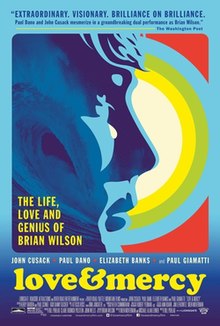 Director: Bill Pohlad
Director: Bill PohladGenre: Biographical Drama
Starring: Paul Dano, John Cusack, Elizabeth Banks, Paul Giamatti
Distributed by: Roadside Attractions
Release Date: June 5, 2015
My Rating: 7.5/10
Even today, it's rare to see a biopic that portrays a visceral, emotionally charged account of a celebrity's personal or professional life. And yet, that is exactly what Love & Mercy does in this beautifully shot film that could only be more disturbing if it had been a documentary with raw footage. The film delves into the story of Beach Boys frontman Brian Wilson, who after suffering a panic attack during a live performance, embarks on a journey to produce a revolutionary album with his band called "Pet Sounds." The young Wilson (Dano) ends up working more behind-the-scenes in the recording studio during the band's tour, and despite his father's snide and confidence-crushing remarks on what he considered to be puerile and poorly-written music, Wilson perseveres and even fires his father as his manager.
The film constantly flashes back, at times somewhat too quickly and disconnectedly, between the 1960s and 1980s, during which we see an even more jaded, confused, and almost catatonic Brian Wilson (Cusack), who meets his future second wife Melinda (Banks), a car saleswoman, after a failed attempt at buying a car. Wilson is also placed under the care of psychotherapist Eugene Landy (Giamatti), although 'care' is clearly identified as a euphemism from the start. Landy incorrectly diagnoses Wilson with paranoid schizophrenia, and thus not only patronizes him, but chastises him for nearly everything, overmedicates him, manipulates him and his relationship with Melinda, and monitors his every move.
Giamatti is brilliantly terrifying as the nefarious psychiatrist who initially presents the image of an agreeable caregiver, much like many sociopaths. It's shocking to imagine how people like him can often exist, although in hindsight, one can quickly realize that litigation for mistreatment in cases like these was probably much longer and more complex during the 1980s than it is today. A modern-day psychiatrist with such high levels of abuse would never have gotten away with half of the 'therapeutic methods' that Landy did.
Opposite him, Miss Bank's performance appears very linear and monotonous throughout most of the film. However, this could be attributed to the fact that that was exactly how the real Melinda initially reacted to Wilson's situation: with a circumspect attitude, and as we say in Mexico "como el perro de las dos tortas" ("like the dog with the two cakes," i.e. torn between two things), in this scenario the two cakes being helping Wilson, whom see sees genuine kindness in, and complying with Landy's demands of staying away from him to improve his health.
The studio recording scenes showing the legendary band's music developments beautifully demonstrate Brian Wilson's ability to mesh together dozens of vocal sounds and instruments in a europhic manner via original musical arrangements. These scenes also overtly reveal the disagreements between the different Beach Boys, especially the other members' swelling discontent with Brian Wilson's controlling, obsessive, and perfectionist nature, along with his growing selfishness.
Dano draws empathy as the diffident young Wilson, and one can veritably see just how precarious his mental state was for many years. What is perhaps the most mentally disturbing montage of constant flashbacks between the young Wilson and the older Wilson laying in bed in a near-catatonic stupor (don't worry, no explicit violence or other graphic images are displayed, only emotional torture) presents the pinnacle of the musician's illness toward the end of the film. The alternation between close-ups and long takes, combined with the eerily soft background music devoid of lyrics almost makes the scene appear as a modern-day infomercial for mental illness, which feels much longer than it actually is due to its visceral nature.
Like many other biopics, the film concludes with a black screen and a few short blurbs describing the end results. However, a final scene showing the real-life Brian Wilson performing the title track "Love and Mercy" at a concert in 2013 proves a wonderfully soothing tactic to close the movie.
No comments:
Post a Comment